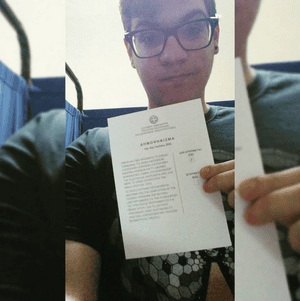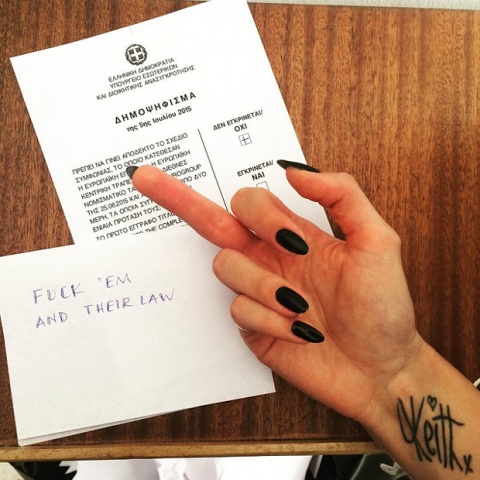Greece’s young people voted against the harsh bailout terms set out by creditors in Sunday’s referendum, voting in favour of no – or Oxi – by around 2 to 1. Analysts had predicted that the ballot could be swung by the youth vote, with some polls suggesting that 80 per cent of young Greeks would vote against the plan.
Greece’s young people were hit hard by the financial crisis, more than almost any other sector of society. Youth unemployment currently rages at record levels, and Greece registers the lowest score for personal wellbeing of all Organisation for Economic Co-operation and Development (OECD) countries.
We spoke to three young people about why they voted no, and what hopes they have for the future.
 “We should all unite and be strong together.” Photograph: vivalaflam_/ Instagram
“We should all unite and be strong together.” Photograph: vivalaflam_/ Instagram
George Flamouris, 20, Serres
I voted no because I think having our own currency will give us better and more efficient management over our economy. Let’s take Iceland for example. They said no to the IMF, and now after five years, they are the fastest growing economy in Europe.
There have been suicides because of how bad things have become. Our previous governments promised us no austerity measures. But then they passed two memorandums and drove us to the worst, favouring the rich and those who have interests against middle class.
Last year, I made it into a university in a city nearby. At that time, only my dad had a job. My family couldn’t afford to to send me there, so I got stuck in my city. Our economic situation limited not only mine, but most children’s futures. I could have had greater potential for a prosperous future elsewhere, rather than in my own city.
Now, both of my parents work in the private sector, without knowing if tomorrow they will still have a job. We can only afford the basics: food and water. Every month we struggle to make ends meet, and we have to take out money from our savings to afford all the bills and loans.
Even though I didn’t vote for Syriza, I believe that they have been the best government in modern history. They may not have an agreement yet, but voting no will get rid of more austerity measures and more relief will come to Greek homes.
Personally, I’m planning to leave the country at some point, after I finish school. But that’s only because I have the privilege to have an Australian citizenship. Under no circumstances do I recommend that people leave the country. We should all unite and be strong together.
 georgiafucshia Photograph: georgiafucshia/ Instagram
georgiafucshia Photograph: georgiafucshia/ Instagram
Georgia Anastasiadou, 30, Athens
I voted no because in all these previous years nothing has changed and nothing has been improved. In fact, it’s only been the opposite. It has been a struggle without any outcome.
The yes voters are mostly people who have become rich in the previous years by the former governments. People who own or work at national enterprises and those who are really afraid and affected by the media’s propaganda.
I am 30 years old, I have a university diploma with a masters degree, and I do not have my own job right now. I still live with my parents and my future is not certain. Last week my employment contract ended. It was only for 8 months, and I waited for over two hours to get my unemployment card. The media doesn’t show such stories.
You can feel the anxiety and the agonising of people wondering what’s next. If the result is a yes, the best scenario is that everything stays the same. Worst case scenario, more strict measures and punishment for daring to ask for changes.
 “After many years there is hope on the horizon.” Photograph: nataliargirop/ instagram
“After many years there is hope on the horizon.” Photograph: nataliargirop/ instagram
Natalia Argiropoulou, 22, Patras
I voted no because no appears to be the most rational choice, both in principle and in practice.
I come from a middle class family with five members. The crisis is present in my daily life, in the lives of most people. My parents’ monthly income has fallen even though my mum tries hard to tell us that we can live from now on as before.
My education has suffered. I know that I can’t do anything more than just a degree in this country. And a degree that’s hardly recognised by universities outside of Greece. Ι’m indescribably happy about what I study but disappointed by the opportunities offered to me.
I choose to vote no not only for my country but for the whole of Europe. This situation was caused by the administration mechanisms in Europe who favour finances and not humans. Νobody can stand the policies.
I’m not a supporter of Syriza however I believe in similar ideas. I think that this government tries hard and resists. This is very important because it has never happened before with any Greek government. After many years there is hope on the horizon.


Spread the word